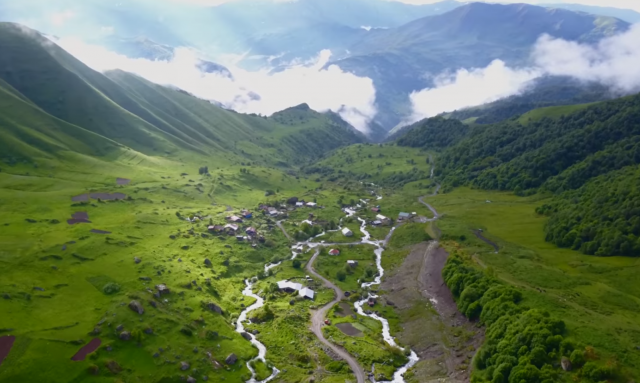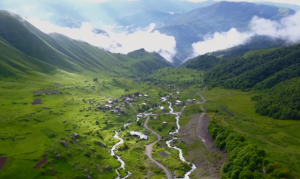Controversial Road Would Improve Tourism but not Agriculture
In May of last year, construction of the initial sections of the “Sno-Juta-Roshka-Shatili-Omalo-Khadori Valley-Batsara-Akhmeta Road Construction Project” commenced. This project hopes to run pavement from Kazbegi through Khevsureti to Tusheti and would represent the first interregional paved highway for the area.
“Road users and especially, local population, will be able to move on a new, comfortable and safer road,” says an official statement at build.gov.ge. “Travel time and cost will be reduced. Furthermore, regional connectivity will be improved, and social-economic opportunities enhanced.”
This project has been met with significant pushback. A popular petition called “Save the High Caucasus Mountains from Destructive Road Construction” criticizes the project for the environmental damage that will result and asserts such a road will violate the rights of traditional communities and that conflict with local populations will be inevitable. The petition, which has collected nearly 10,000 signatures, calls on the government of Georgia to stop this project.
Yet Khevsureti residents do not oppose the project and have long petitioned for improved infrastructure in Khevusreti, according to interviews conducted in Khevsureti in the summer of 2017. They disagree with other Georgians who oppose road building on their behalf.
“We want it both ways—we want people living up there, but we don’t want to build a road,” said Otari Tsiklauri, a resident of Roshka. “But it doesn’t work like that, does it? It is the 21st century after all. People should not be struggling to survive with the help of some horses and donkeys.”
Yet locals also expressed a strong preference for improving roads from lowlands over an interregional highway. With stretches reaching as high as 3100 meters, the Kazbegi-Khevsureti section of the road will be closed much of the year and will require substantial maintenance.
The state of the existing roads to the lowlands should be dealt with first, locals said, as poor conditions increase the costs to transport goods and materials and make access to Khevsureti seasonal and highly dependent on weather conditions. These constraints greatly reduce the production capacity of local farms and hinder the development of mountain dairy and livestock value-chains.
Residents felt the new Kazbegi-Khevsureti road will primarily benefit households directly involved in the summer tourism industry in popular destinations such as Roshka, Shatili, and Mutso. For most Khevsureti households, income is generated by traditional agriculture such as cattle raising and dairy processing for mountain products which can be sold for a premium on lowland markets such as hacho, cheese, erbo and matsoni.
A 2015 USAID report links dairy challenges in Georgia to lack of qualified veterinarians, access to medicines, and feed challenges. While much has been done in Georgia since to relieve these constraints, Khevsureti and Tusheti still suffer from the poor infrastructure making crucial inputs accessible.
Khevsureti has also experienced severe outmigration in recent years. The official 2014 census recorded only 354 people living in the area, down from 866 people counted in the 2002 census.
In February of last year prime Minister Giorgi Kvirikashvili said, “The roads that link mountainous regions to each other are very important and we are working on them. They are important because otherwise it would be impossible to preserve these regions’ cultures for future generations.”
While connectivity is crucial for alleviating the difficult mountain living conditions that lead high rates of outmigration, it is unclear if a road from Kazbegi and Khevsureti to Tusheti would help reverse these trends.
Some commenters have claimed sections of the “Sno-Juta-Roshka-Shatili-Omalo-Khadori Valley-Batsara-Akhmeta Road Construction Project” have since been canceled and much of the road will now not be paved, but no official updates have been issued about the project which was set to end in February of this year, according to the current government project page at build.gov.ge. A government spokesperson could not be reached for comment.
By Ryan Michael Sherman












